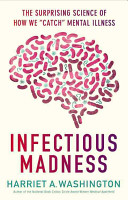2018 School Spending Survey Report
Infectious Madness: The Surprising Science of How We "Catch" Mental Illness
Little, Brown. Oct. 2015. 304p. illus. notes. index. ISBN 9780316277808. $28; ebk. ISBN 9780316277792. MED
COPY ISBN
VERDICT Recommended for fans of science journalism and readers interested in the next "hot topic" in biological psychiatry. [See Prepub Alert, 4/13/15.]
RELATED
ALREADY A SUBSCRIBER? LOG IN
We are currently offering this content for free. Sign up now to activate your personal profile, where you can save articles for future viewing




Comment Policy:
Comment should not be empty !!!